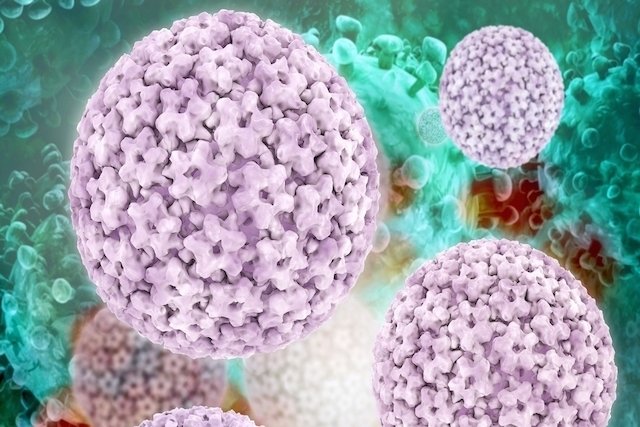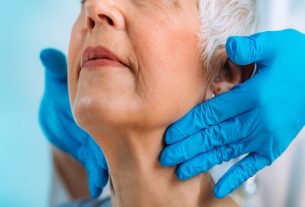The human papillomavirus, also known as HPV, is a virus that can be transmitted sexually and affects the skin and mucous membranes of men and women. More than 120 different types of the HPV virus have been described, of which 40 preferentially affect the genitals, with types 16 and 18 being high risk, which are responsible for 75% of the most serious lesions, such as cervical cancer.
Most of the time, HPV infection does not lead to the appearance of signs and/or symptoms of infection, but in others, some changes can be noticed, such as genital warts, cancer of the cervix, vagina, vulva, anus and penis. Furthermore, they can also cause tumors in the inside of the mouth and throat.
Therefore, it is important to have regular consultations with the gynecologist, in the case of women, at least once a year, or a urologist in the case of men, to carry out tests that detect HPV, the severity of the infection and, thus, carry out the more appropriate treatment, if necessary. Check out the main tests that detect HPV.

Common questions about HPV
The most common questions about HPV are:
1. Is HPV curable?
Normally, HPV infections are controlled by the immune system and the virus is normally eliminated by the body.
However, while the virus is eliminated by the immune system, even in the absence of signs or symptoms, there may be a risk of infecting other people. In any case, it is important that any lesion caused by HPV is regularly evaluated in order to treat and prevent more serious diseases, in addition to strengthening the immune system.
2. Is HPV an STI?
HPV is a sexually transmitted infection (STI) that can be transmitted very easily during any type of sexual contact, genital, anal or oral, which is why it is very important to use a condom. Find out more about how you get HPV.
3. Does using a condom prevent transmission?
Despite being the most used contraceptive method, condoms cannot completely prevent HPV infection, because the lesions can be present in regions that are not protected by condoms, such as the pubic region and the scrotum.
However, the use of condoms is recommended in all sexual relations, as it reduces the risk of contagion and the occurrence of other sexually transmitted infections such as AIDS, hepatitis and syphilis. Check out the main STIs.
4. Can it reach through towels and other objects?
Although the HPV virus can live on surfaces, the risk of transmission through objects such as towels, underwear, toilet bowls, cutlery or swimming pools is very rare, and there are not enough scientific studies that accurately determine the ability of the virus to be transmitted. through objects. However, there is such a possibility.
Therefore, as a general personal hygiene measure, you should always avoid sharing towels or underwear with other people, and avoid sitting on public toilets.
5. Can HPV be transmitted through soap?
HPV is not transmitted by soap, because it is a sexually transmitted infection that is transmitted through skin-to-skin contact with a person who has the virus infection.
6. Does HPV stick to nail clippers?
HPV cannot be caught by nail clippers, as the virus is transmitted through skin-to-skin contact with an infected person, such as the mucous membranes of the vagina, penis, anus or mouth, through unprotected intimate contact.
7. Can HPV be transmitted through childbirth?
HPV can be transmitted from mother to baby during vaginal birth, when it comes into contact with wounds or warts present in the woman’s genital region. Know all the ways HPV is transmitted.
8. Does HPV normally have no signs or symptoms?
People who have an HPV infection may not show any signs or symptoms, so most women discover that they have this virus only through a Pap smear, which is why it is very important to have this test regularly. See how to recognize the symptoms of HPV.
9. Can genital warts disappear?
Warts can disappear naturally, without any type of treatment. However, depending on the size and location, there are several ways to treat them, such as applying a cream and/or a solution that removes them slowly, by freezing, cauterization or laser, or even through surgery.
In some cases, warts may reappear even after treatment. Check out how to treat genital warts.
10. Does the vaccine protect against all types of viruses?
The vaccines that are available only protect against the most common types of HPV, so if the infection is caused by another type of virus that the vaccine does not cover, it could lead to a disease. Furthermore, it is important that vaccine doses are taken at the correct intervals to ensure immunization against the most common types of HPV. See the main HPV vaccines.
In addition to the vaccine, it is very important to take other preventive measures, such as using a condom, to reduce the risk of HPV infection and avoid other sexually transmitted infections.
In the case of women, a Pap smear should be done at least once a year, or as advised by the gynecologist, to screen for cervical cancer.
11. How does the vaccine protect against HPV?
The HPV vaccine stimulates the production of antibodies by the immune system against some types of HPV that vaccines protect, such as 6, 11, 16, 18, 31, 33, 45, 52 and 58, and so, if the person has contact with any of these viruses, the body helps to fight the virus and prevent the disease.
12. Do genital warts appear frequently?
One in 10 people, whether men or women, will have genital warts throughout their lives, and they may appear weeks or months after sexual contact with people infected with HPV. See how to identify genital warts.
13. Doesn’t HPV cause diseases in men?
Just like women, men infected with HPV may also develop genital warts. Furthermore, the virus can also cause cancer of the penis or anus. Find out how to identify and treat HPV in men.
14. Do all women with HPV have cancer?
In most cases, the immune system eliminates the virus, however, some types of HPV can lead to the formation of genital warts and/or benign changes in the cervix. Therefore, it is very important to strengthen the immune system by eating well, sleeping well and doing physical exercise.
If these abnormal cells are not treated, they can lead to cancer, which can take several years to develop, so early detection is very important.
15. How is HPV diagnosed?
There are several tests that can be done to diagnose HPV, the main one for women being the Pap smear.
Furthermore, for both women and men, clinical evaluation of the genital region or mouth can detect lesions or warts caused by HPV. However, diagnostic tests, such as biopsy, and molecular tests, such as hybrid capture or RT-PCR, are necessary to confirm the infection, lesion and/or type of HPV. See the main tests for diagnosing HPV.
16. Is there treatment for HPV?
HPV treatment involves the use of medicines in the form of ointment, cryotherapy, laser or surgery to eliminate warts that have appeared, and depends on the number of warts, size and location. Check out the main treatments for HPV.

Sign up for our newsletter and stay up to date with exclusive news
that can transform your routine!
Warning: Undefined array key "title" in /home/storelat/public_html/wp-content/plugins/link-whisper-premium/templates/frontend/related-posts.php on line 12
Warning: Undefined array key "title_tag" in /home/storelat/public_html/wp-content/plugins/link-whisper-premium/templates/frontend/related-posts.php on line 13



